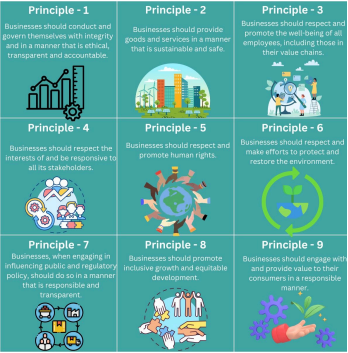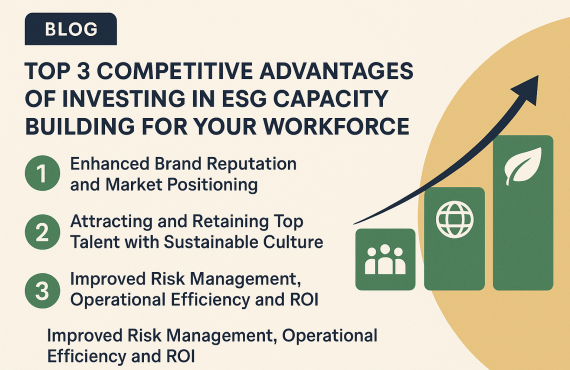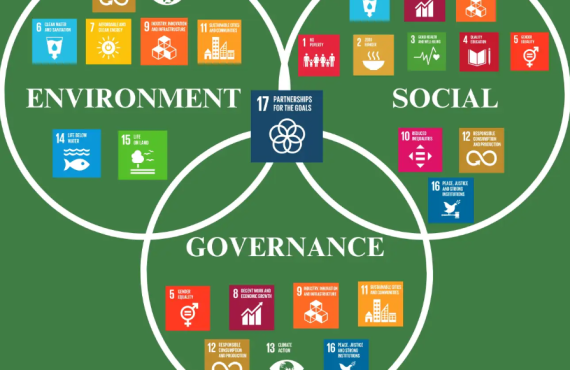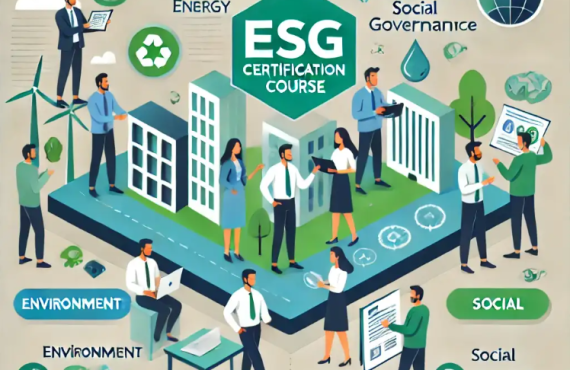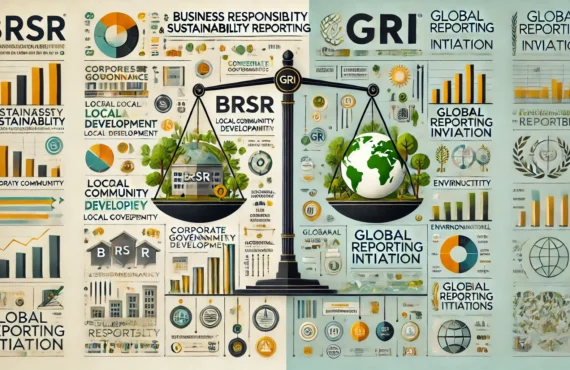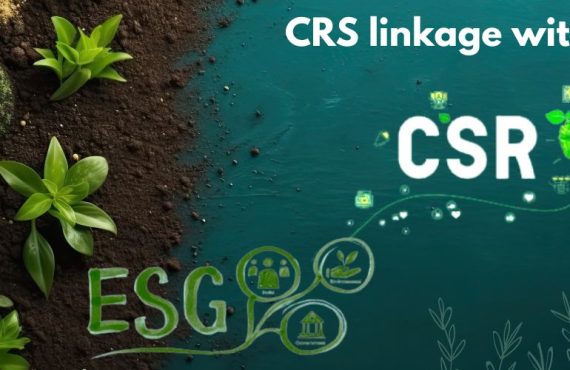In today’s competitive business landscape BRSR’s 9 Principles Help Your Business Stay Ahead, adopting sustainable and responsible practices is not just a moral obligation but a strategic advantage. The Business Responsibility and Sustainability Reporting (BRSR) framework, introduced by SEBI (Securities and Exchange Board of India), serves as a guide for companies to align their operations with sustainability goals. By focusing on environmental, social, and governance (ESG) aspects, BRSR helps businesses remain resilient, transparent, and competitive.
What Is BRSR?
BRSR’s 9 Principles Help Your Business Stay Ahead The BRSR framework is a structured approach to measuring, managing, and reporting o n a company’s sustainability efforts. It emphasizes transparency, accountability, and ethical operations. By adhering to BRSR principles, businesses can:
- Build stronger stakeholder relationships.
- Enhance their reputation as a responsible entity.
- Align with global ESG standards.
- Drive positive social and environmental impact.
Let’s explore each principle in detail to understand its importance and how it can contribute to your business’s success.
1. Principle of Ethical Governance: Conducting Business with Integrity
This principle highlights the importance of ethical governance, emphasizing transparency, accountability, and adherence to legal standards. BRSR’s 9 Principles Help Your Business Stay Ahead It promotes a culture of integrity across all levels of the organization.
Why It Matters
- Builds Trust: Transparent governance fosters stakeholder confidence.
- Reduces Risks: Ethical behavior minimizes legal disputes and reputational damage.
- Strengthens Brand: Companies with high ethical standards attract quality investors and partners.
Steps to Implement
- Establish clear governance policies and conduct regular audits.
- Train employees on ethical standards and compliance requirements.
- Maintain open communication with stakeholders regarding governance practices.
2. Principle of Safety: Ensuring Safe and Sustainable Goods and Services
This principle encourages businesses to prioritize consumer safety and minimize the environmental footprint of their products and services. It underscores the need for innovation in sustainable production.
Why It Matters
- Meets Consumer Demand: Consumers increasingly prefer eco-friendly products.
- Lowers Costs: Sustainable practices reduce waste and operational expenses.
- Boosts Loyalty: Safe, high-quality products enhance customer trust.
Steps to Implement
- Invest in sustainable product design and manufacturing processes.
- Use renewable resources and reduce non-biodegradable packaging.
- Clearly communicate safety and sustainability features to consumers.
3. Principle of Employee Well-Being: Promoting Workforce Welfare
This principle focuses on ensuring fair treatment, equal opportunities, and a safe working environment for employees. It advocates for personal and professional growth initiatives.
Why It Matters
- Improves Productivity: Happy employees are more engaged and productive.
- Attracts Talent: Businesses with strong employee policies appeal to top talent.
- Reduces Attrition: A supportive workplace minimizes turnover costs.
Steps to Implement
- Offer competitive wages and comprehensive benefits.
- Promote diversity, equity, and inclusion within the workforce.
- Provide training and career development opportunities.
4. Principle of Stakeholder Inclusivity: Respecting Stakeholder Interests
This principle emphasizes understanding and addressing the needs of all stakeholders, including employees, customers, investors, and local communities. Businesses are encouraged to align their objectives with stakeholder expectations.
Why It Matters
- Enhances Collaboration: Engaged stakeholders contribute to shared goals.
- Strengthens Relationships: Mutual respect builds long-term trust.
- Informs Strategy: Stakeholder feedback drives better decision-making.
Steps to Implement
- Conduct regular stakeholder meetings to understand their concerns.
- Incorporate stakeholder input into strategic planning.
- Communicate transparently about business decisions and their impacts.
5. Principle of Human Rights: Promoting and Respecting Fundamental Rights
This principle calls for businesses to uphold human rights across their operations, avoiding discrimination, exploitation, and unfair labor practices.
Why It Matters
- Avoids Legal Risks: Compliance with human rights standards prevents penalties.
- Enhances Reputation: Ethical operations appeal to socially conscious investors and customers.
- Fosters Employee Loyalty: Fair treatment boosts workplace morale.
Steps to Implement
- Establish a comprehensive human rights policy.
- Ensure fair wages and working conditions throughout the supply chain.
- Address grievances effectively and promptly.
6. Principle of Environmental Stewardship: Protecting and Restoring the Environment
This principle emphasizes reducing environmental impacts, addressing climate change, and adopting sustainable practices.
Why It Matters
- Meets Compliance Standards: Proactive environmental measures align with regulations.
- Increases Efficiency: Sustainable practices reduce energy and resource consumption.
- Attracts Green Investors: A commitment to the environment enhances investment appeal.
Steps to Implement
- Conduct energy audits and reduce carbon emissions.
- Use renewable energy sources and adopt waste management strategies.
- Partner with organizations for reforestation or conservation projects.
7. Principle of Inclusive Growth: Supporting Equitable Development
This principle ensures that economic growth benefits all segments of society. It advocates for inclusivity in hiring, community engagement, and development initiatives.
Why It Matters
- Expands Opportunities: Inclusive policies open access to underserved markets.
- Builds Goodwill: Supporting local communities enhances the company’s reputation.
- Drives Innovation: Diverse perspectives lead to creative solutions.
Steps to Implement
- Launch community skill-building and educational programs.
- Ensure diversity in hiring and leadership roles.
- Invest in local infrastructure and social development projects.
8. Principle of Ethical Advocacy: Transparent and Responsible Lobbying
This principle requires businesses to advocate for policies and engage with governments transparently and responsibly. Advocacy efforts should align with broader societal goals.
Why It Matters
- Builds Credibility: Transparent lobbying fosters trust among stakeholders.
- Influences Policy Positively: Ethical advocacy aligns regulations with sustainability goals.
- Prevents Backlash: Transparent practices avoid public criticism.
Steps to Implement
- Disclose advocacy and lobbying activities in public reports.
- Align lobbying efforts with environmental and social priorities.
- Collaborate with policymakers ethically and transparently.
9. Principle of Responsible Consumer Practices: Respecting Consumer Rights
This principle emphasizes delivering safe, high-quality products and services while avoiding misleading advertisements or exploitative practices.
Why It Matters
- Increases Trust: Ethical consumer practices build lasting customer relationships.
- Avoids Legal Issues: Transparent marketing prevents regulatory penalties.
- Enhances Brand Loyalty: Responsible businesses retain consumer trust.
Steps to Implement
- Clearly communicate product benefits, risks, and sustainability aspects.
- Provide robust after-sales support and grievance mechanisms.
- Avoid exaggerated or misleading marketing claims.
Conclusion: Leveraging BRSR for Competitive Advantage
The BRSR’s nine principles provide a robust framework for businesses to thrive responsibly in an ever-evolving market. By embracing these principles, companies can:
- Build trust and loyalty among stakeholders.
- Achieve operational efficiencies through sustainable practices.
- Strengthen their brand as a socially responsible entity.
Incorporating these principles is more than compliance—it’s a strategic move toward future readiness. By aligning your business with the BRSR framework, you can position your company as a leader in sustainable growth while contributing positively to society and the environment. Adopt these principles today and lead the way to a sustainable and prosperous future.


